Key takeaways:
- Support groups create a sense of belonging and foster open communication, promoting emotional healing and personal growth.
- Shared experiences in support groups can lead to profound insights and practical advice, strengthening relationships among members.
- Establishing a common goal fosters trust and collaboration, ensuring everyone feels valued and focused on collective aspirations.
- Planning engaging meetings in a comfortable atmosphere encourages individuals to share their stories, reinforcing emotional bonds and group dynamics.
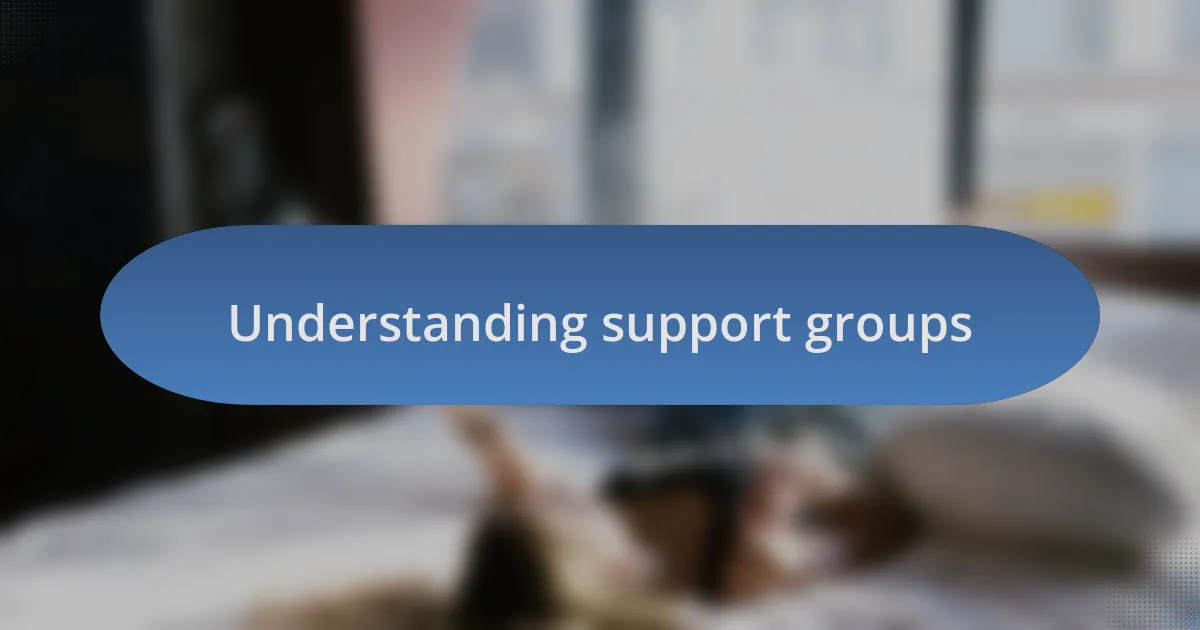
Understanding support groups
Support groups are safe spaces where individuals come together to share experiences, challenges, and triumphs. I’ve found that these groups often become like a second family, where members relate to one another’s journeys in ways outsiders may not fully grasp. Have you ever felt that sense of belonging that comes from being around people who genuinely understand your struggles?
What strikes me most about support groups is how they foster open communication and emotional healing. During one of my first meetings, I listened as a member shared their story about coping with anxiety while using cannabis. Watching how much relief that individual felt just by voicing their experiences reinforced my belief that sharing can be a powerful tool for personal growth. Isn’t it amazing how a simple conversation can lead to profound shifts in perspective?
In my experience, the dynamics within a support group can vary widely, but they all share a foundation of trust and respect. I’ve witnessed the transformation in people as they engage in thoughtful discussions, exchange tips, and even laugh together about their hurdles. Asking questions and seeking advice not only helps members feel valued but also strengthens the community. When was the last time you felt truly heard and supported in your own journey?
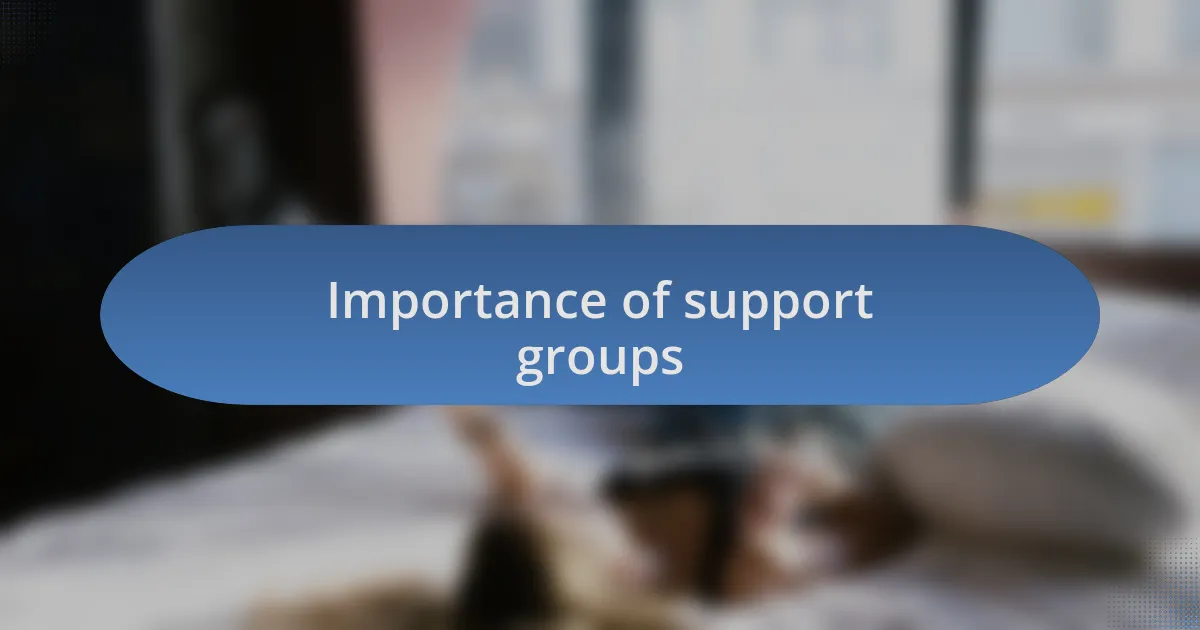
Importance of support groups
Support groups play a crucial role in fostering a sense of community and belonging. I remember attending one of our early meetings where a new member shared their story of isolation. It struck me how quickly the group rallied around them, sharing similar experiences and providing comfort. Isn’t it incredible how people can come together to create an environment that alleviates loneliness?
What I’ve noticed is that support groups not only provide emotional backing but also practical advice. During one session, a member shared a method they used to manage stress with cannabis that I had never considered. The exchange of this type of knowledge is invaluable—it highlights how we can learn from each other and grow collectively. Have you ever thought about how insights shared in such intimate settings can lead to personal breakthroughs?
The bond formed in support groups can lead to lasting friendships and networks of support beyond the meetings themselves. I recall feeling a surge of encouragement when, after weeks of sharing and listening, a fellow member reached out to me outside of our group. When we nurture these connections, we create a safety net that extends into our everyday lives. Isn’t it comforting to know that you have people who genuinely care about your well-being?

Overview of Cannabis Expo
The Cannabis Expo is a vibrant gathering that celebrates the diverse world of cannabis, bringing together cultivators, enthusiasts, and industry professionals. I still remember my first visit; the air buzzed with energy as I navigated through stalls showcasing everything from innovative products to educational resources. Wasn’t it fascinating to see how far our understanding of cannabis has come?
At the Expo, attendees can explore a wide range of topics, from legal issues to health benefits, which creates an invaluable learning experience. I was particularly struck by a panel discussion on responsible use that challenged my previous misconceptions. Have you ever encountered a moment that shifted your perspective completely? That’s what these events do—they open doors to new insights and conversations.
Additionally, the sense of community at the Cannabis Expo is palpable. I found myself engaging with fellow attendees who were just as passionate about cannabis as I was, sparking friendships that I cherish even today. Isn’t it amazing how sharing similar interests can lead to connections that enrich our lives long after the event has ended?

Identifying a common goal
Identifying a common goal was essential when I started the support group. It became clear that everyone had a shared desire for safe access to cannabis and accurate information. I vividly remember our first meeting; there was an undeniable energy in the room as we discussed our hopes for education and community support, all fueled by a collective passion.
I found that framing our conversations around a specific objective kept the focus sharp and engaging. During one discussion, we asked ourselves, “What do we want to achieve together?” It was incredible to see how our individual experiences blended into a unified vision, driving us to create a resource that could empower others navigating the cannabis landscape.
As we articulated our goals, I realized how important it was to include everyone’s voice. This process fostered trust and collaboration, as each member felt valued. Looking back, I can’t help but think—how often do we take the time to connect over shared aspirations rather than differences? This realization transformed our group into a supportive environment where individuals could thrive together.
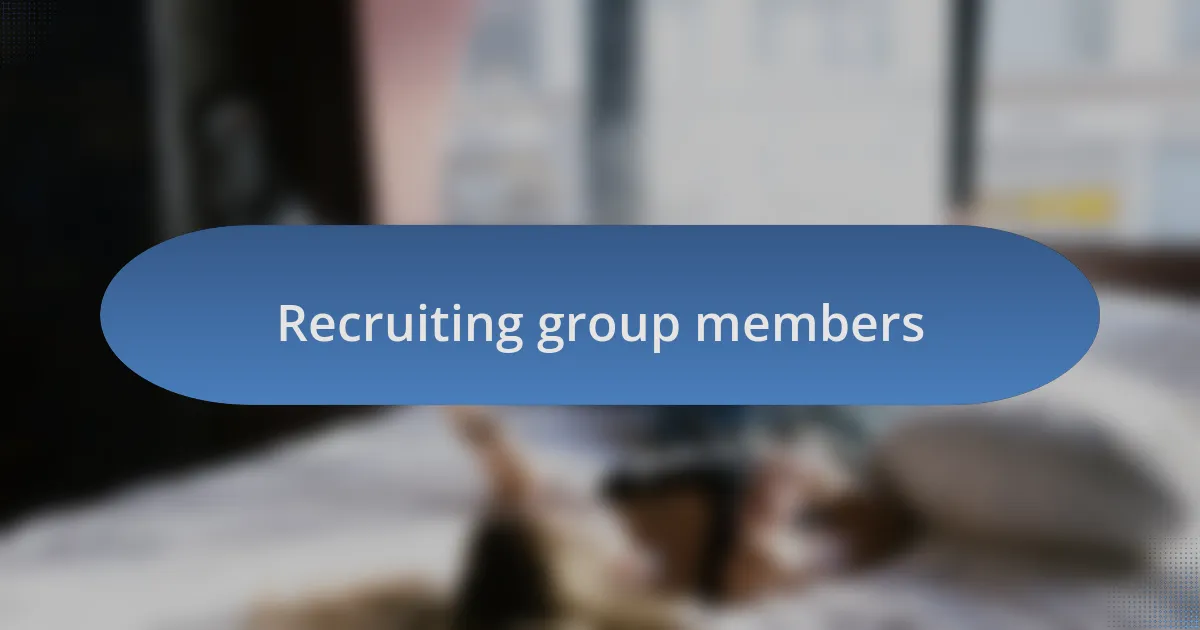
Recruiting group members
Recruiting group members began with a simple yet powerful strategy: I reached out to people whose stories resonated with the mission. I remember chatting with a friend who had struggled to find reliable cannabis information. Her excitement about the idea of a supportive community was contagious, and it made me realize how important personal connections can be in attracting like-minded individuals who are eager to join a cause.
Another effective method was leveraging local events, where I could meet potential members face-to-face. At a cannabis educational seminar, I shared our group’s vision with anyone willing to listen. One particularly enthusiastic woman approached me afterward, saying that she longed to be part of a network that not only shared knowledge but also offered emotional support. Her passion reinforced my belief that recruiting isn’t just about numbers; it’s about building relationships based on trust and shared experiences.
I also utilized social media to widen our reach. Crafting posts that spoke from the heart allowed me to connect with others who might feel isolated in their journey. I recall receiving a heartfelt message from a stranger who said she had been searching for a community like ours. Each new member added unique perspectives and stories, proving that recruiting is not just filling seats—it’s about creating a tapestry of support that benefits everyone involved.
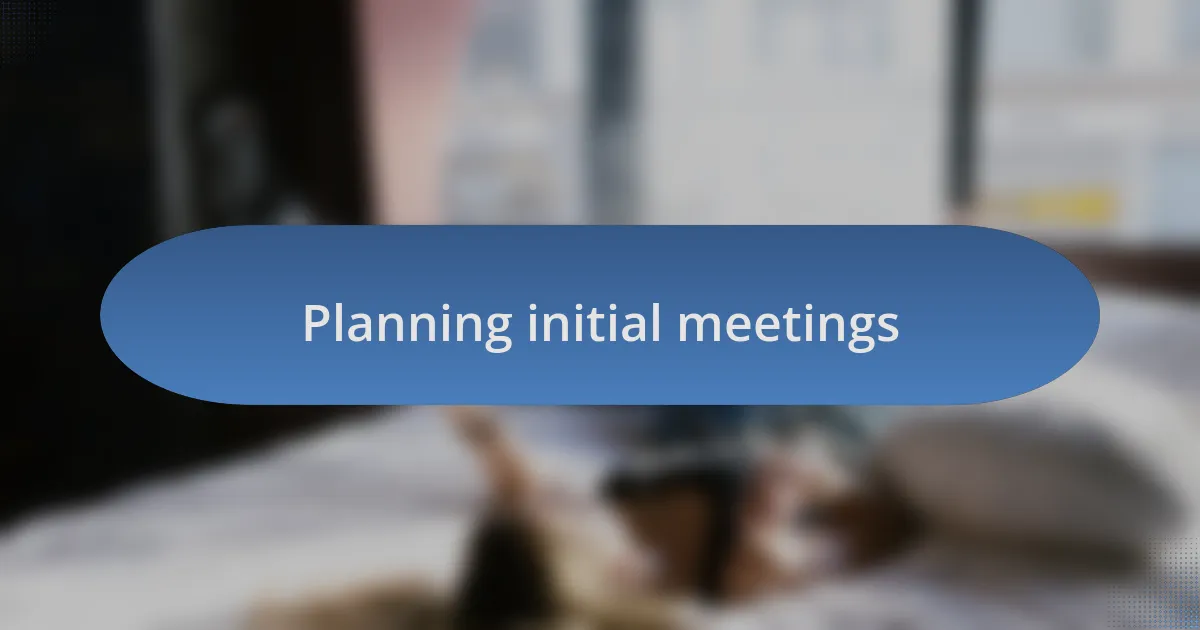
Planning initial meetings
When I started planning the initial meetings, I quickly realized that setting the right atmosphere was crucial. I chose a cozy café, a place where people could relax and feel comfortable sharing their thoughts. It’s interesting how an inviting environment can ease tensions and encourage openness. Picture a circle of chairs, steaming mugs, and the sound of gentle conversation—almost like a warm embrace inviting everyone to join in.
I focused heavily on crafting an agenda that prioritized connection over formality. Initially, I thought about diving straight into discussions on cannabis science, but then I wondered: What if we started with personal stories instead? Our first meeting became a beautiful sharing circle, where each member spoke about their journey and what led them to us. I could feel the solidarity growing as we opened up; that emotional bond made it clear that understanding one another would be the foundation of our support group.
As we planned the frequency of our meetings, I knew consistency was essential. I recall debating with myself whether weekly or monthly gatherings would be best. Ultimately, I decided that meeting biweekly struck the perfect balance. This way, we maintained engagement without overwhelming anyone’s schedule. I remember hearing from several members that they looked forward to these catch-ups, viewing them as not just meetings but essential check-ins on our mutual journeys. It reinforced my belief that creating a support group is as much about the rhythm of meetings as it is about the individuals involved.
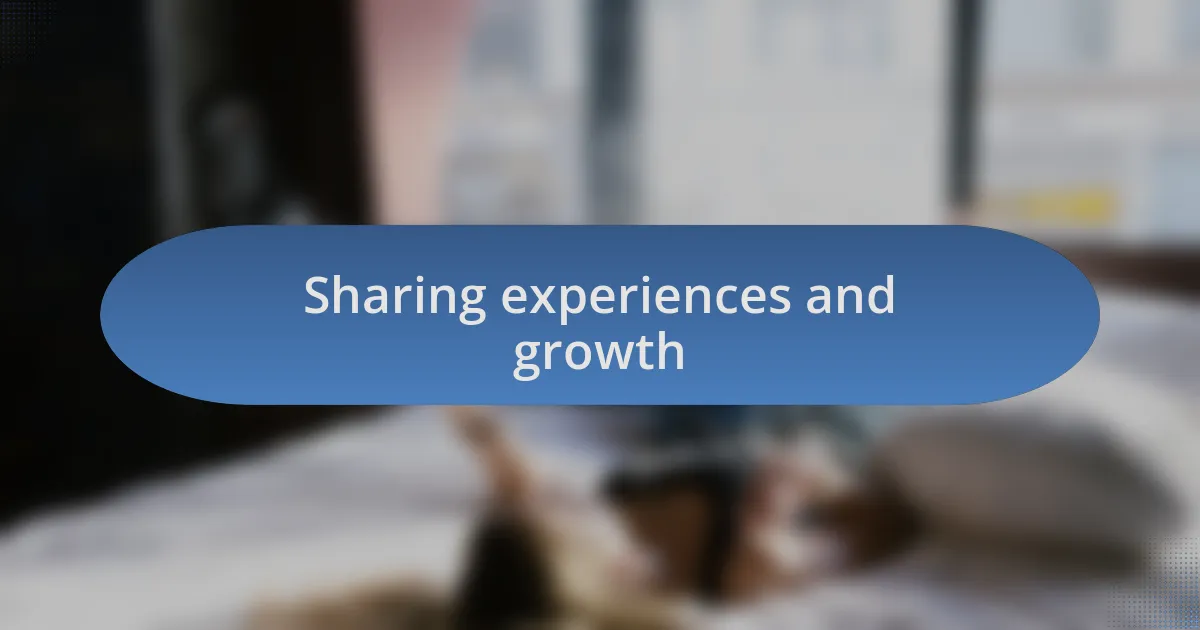
Sharing experiences and growth
Sharing personal experiences can be transformative, and I’ve witnessed this firsthand in our support group. During one meeting, a member shared their struggles with anxiety related to cannabis use. It was incredibly touching to see others nodding in understanding, realizing they weren’t alone in their battles. Those moments of vulnerability opened the floodgates for others to share similar stories, creating an atmosphere rich in empathy.
I remember this one session where we engaged in a guided discussion about how cannabis impacted our daily lives. Participants were honest, revealing how it helped them cope with pain, but also how it sometimes made them feel isolated. This duality sparked a profound conversation about not only cannabis but about life—offering support and inspiring growth through shared experiences. It was clear that these conversations were not just therapeutic; they were catalysts for personal development.
Growth in a support group doesn’t stem solely from sharing struggles; it blossoms from celebrating victories too. I still recall the excitement in the room when one member announced they had successfully reduced their medication through cannabis. The cheers and encouragement felt like a collective acknowledgment of progress, reinforcing our connections and motivating everyone to keep pushing forward. How often do we get to witness such uplifting moments? It’s these triumphs that solidify the bonds we are creating, reminding us that we’re all on this journey together.